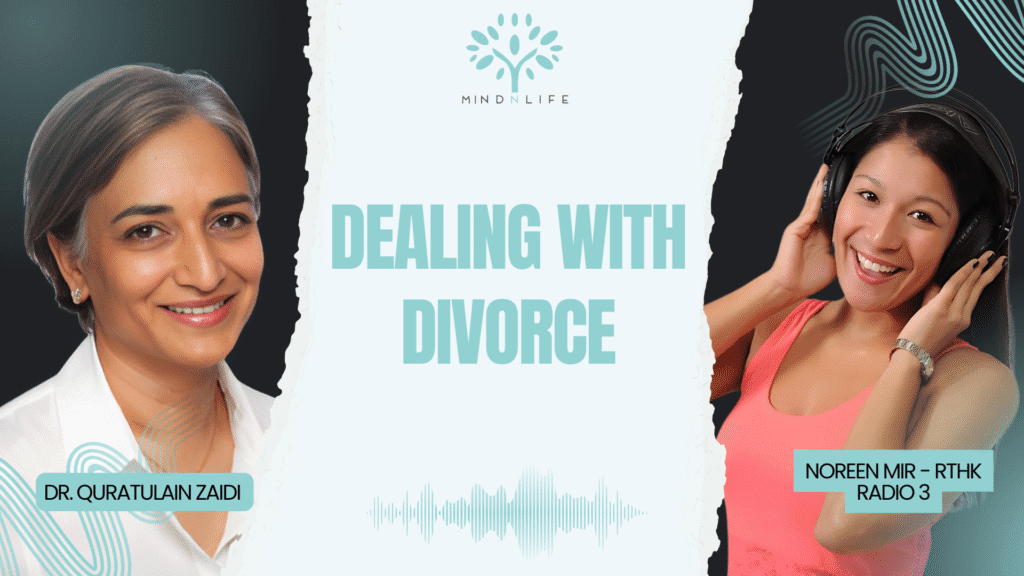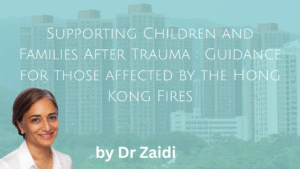Based on a conversation between Dr Quratulain Zaidi and RTHK radio host Noreen Mir
Divorce remains one of life’s most challenging transitions, often shrouded in stigma despite affecting countless families. In a recent chat on RTHK Radio Three’s Brunch programme, clinical psychologist Dr Quratulain Zaidi shared invaluable insights about the emotional rollercoaster of divorce and how families can navigate this difficult journey with greater resilience.
The Emotional Spectrum of Divorce
It’s rarely just one feeling. As Dr Zaidi explains, divorce brings a whole spectrum of emotions that can feel overwhelming. Sometimes one partner is completely blindsided whilst the other has been planning their exit for months. This creates a particularly painful dynamic where one person is desperately trying to catch up whilst their partner has already emotionally left the building.
The common feelings people experience include:
Grief – You’re not just losing your partner, but the entire future you’d imagined together. That’s a profound loss that deserves acknowledgement.
Anger – Especially when the divorce comes as a surprise. This anger might be directed at your partner, yourself, or the circumstances that led to this point.
Shock and confusion – When you’ve missed the signs, you start questioning your ability to read situations accurately. Was any of it real if they were planning to leave whilst you thought everything was fine?
Fear – The unknown is terrifying. Financial instability, loneliness, and uncertainty about the future can feel paralysing.
Relief – If the relationship was toxic or unhealthy, there might be a genuine sense of relief alongside the other difficult emotions.
Protecting the Children
One of the most heartbreaking aspects of Dr Zaidi’s work is seeing how children internalise blame for their parents’ separation. She shared the story of a 16-year-old who said she was the first person to tell him the divorce wasn’t his fault. At sixteen! This highlights how crucial it is for parents to explicitly reassure their children.
The golden rules for helping children through divorce:
- Tell them together with an age-appropriate message
- Make it crystal clear that they are not at fault
- Reassure them that whilst you’re separating as partners, you’ll always be their parents
- Avoid the loyalty bind – children have the right to love both parents independently of what’s happening between you
When parents bad-mouth each other in front of the children, they’re essentially telling the child that half of who they are is bad. You’re asking them to choose sides and take on emotional responsibilities that should never be theirs.
Dr Zaidi mentioned seeing “parentification” – where children feel responsible for their parent’s emotional wellbeing. A six-year-old shouldn’t be thinking, “I have to make sure mummy is happy, so I can’t see daddy.” That’s an enormous burden for little shoulders.
Coping Strategies That Actually Work
Find your neutral person. Whether it’s a trusted friend who can stay objective or a professional counsellor, you need someone you can be completely honest with. Friends and family, despite their best intentions, often can’t help but take sides and offer opinions. You need space to make decisions that are right for your specific situation.
Look after your physical health. Sleep usually goes out the window first when you’re lying there replaying conversations and scenarios. But your body needs rest to cope with this stress.
Set boundaries around the anger. Yes, you’re furious. Yes, you have every right to be. But remember that how you handle this conflict will impact your children far more than the divorce itself.
Manage the practical stuff. Money issues often inflame the worst anger during divorce. Getting professional help with the financial and legal aspects can prevent some of the most toxic conflicts.
Rebuilding Your Life
The question many people ask is: “Will I ever feel normal again?” Dr Zaidi’s answer is reassuring – there absolutely is life and laughter after divorce, and sometimes even during the process.
Start with small goals alongside bigger ones. Take it day by day, knowing that things do settle and improve with time.
Be patient with yourself. This is a process that might take a year or two. Having faith in your ability to cope with adversity is crucial.
Stay flexible in your thinking about how life will look different. The partnership has ended, but your life hasn’t.
Maintain your support network. Even if you’re not always talking about the divorce, staying connected with friends and getting out of the house is vital.
A Final Thought
As one listener, Brian, commented on the programme’s Facebook page: “Society at large does not truly understand the trauma involved in a divorce. It’s deep, it’s complex, and it touches everyone in the family and resonates generationally.”
This observation captures something important – divorce isn’t just a legal process or a lifestyle change. It’s a significant trauma that deserves proper support, understanding, and time to heal. There’s no shame in struggling through it, and there’s certainly no shame in seeking help.
If you’re going through a divorce, remember Dr Zaidi’s words: this is temporary, it will pass, and you have the strength to cope with this adversity. Take care of yourself, protect your children from the conflict, and don’t be afraid to lean on others during this difficult time.
The conversation between Dr Quratulain Zaidi and Noreen Mir highlighted just how much there is to discuss around divorce – from managing anger and finances to rebuilding identity and finding love again. These are conversations worth having, both privately and as a society.
Watch the Video Here:




